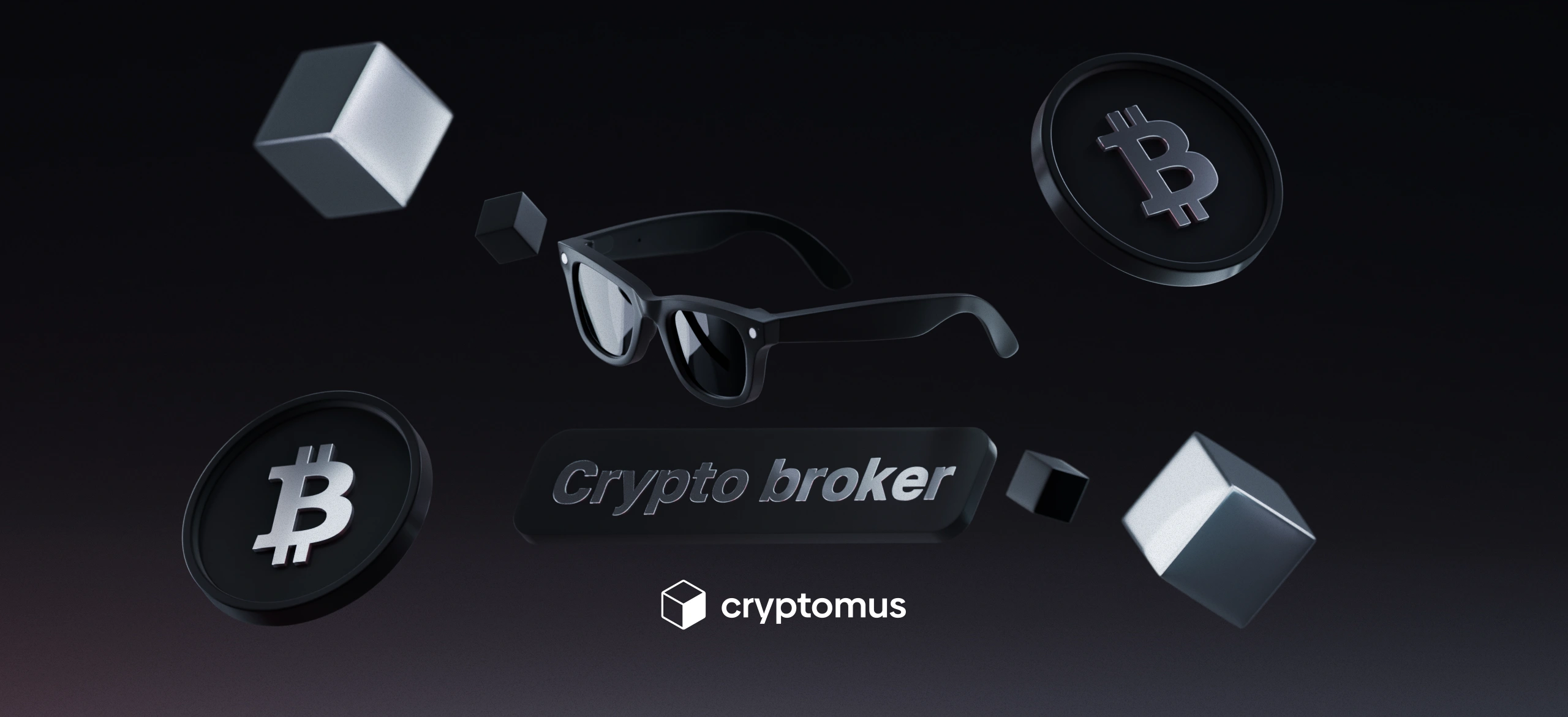
What Is A Cryptocurrency Broker
Table of Contents
More and more people are looking for different ways to enter the markets as it continues to grow. In addition to centralized exchanges which play a key role in the crypto ecosystem, cryptocurrency brokers offer another convenient way to buy and sell digital assets — often with a focus on simplicity and ease of use.
The core difference lies in the operating model: while exchanges match buyers and sellers on the crypto market, brokers enable indirect trading by acting as intermediaries between clients and the market. In this article we will explore how cryptocurrency brokers work, what advantages and limitations they offer, and how their approach differs from that of exchanges.
What Does A Crypto Broker Do?
A crypto broker is known as an intermediary that simplifies the process of trading digital assets for users. Due to the complexity of the trading process, many beginners are looking for professional help in key questions of the trading process. Brokers offer assistance with:
- Opening accounts and setting up trading profiles;
- Placing and managing Buy/Sell orders;
- Analyzing the market, making predictions and developing effective trading strategies.
In addition to these services many cryptocurrency brokers offer additional features to improve the trading experience. These include:
- Providing leverage: when a broker lends a specific amount of money to the client, allowing them to make larger trades than they could with their own capital alone.
- Asset management: some brokers manage clients' cryptocurrency portfolios, handling trades and investments on their behalf to optimize returns.
- Consultation and education: brokers often provide advice and educational resources to help clients better understand cryptocurrency trading, develop strategies and improve their market knowledge.
On each transaction brokers usually charge a commission — it can be a percentage of the trade amount. By providing these services, brokers make trading easier, help clients make better decisions, and increase the chances of successful trades.

Crypto Broker VS Exchange
The main difference between a crypto broker and an exchange lies in how transactions are carried out. On an exchange, transactions occur directly between users: one places a buy order, another a sell order, and the system matches them automatically. This method requires an understanding of market mechanics and the use of limit or market orders, and often comes with lower fees. But it may seem complicated for beginners.
If we talk about a crypto broker — it acts as an intermediary which helps users buy or sell digital assets and manage all the technical aspects of the trading (for example: to place orders and match buyers and sellers). This simplifies the trading process and lowers the barrier to entry for beginners. But brokers usually add a margin to the price which may make the trade slightly less favorable.
To better understand the differences between a crypto broker and an exchange, let's take a look at their key characteristics. The table below will help you see the main factors and make an informed choice.
| Feature | Crypto Broker | Crypto Exchange | |
|---|---|---|---|
| Transaction type | Broker acts as the buyer or seller | Matching of buy and sell orders via order book | |
| Price | May be higher due to the broker's commission | Market-driven price, based on orders | |
| Ease of use | Simplified process, no need for market knowledge | Requires understanding of market orders | |
| Fees | Generally higher due to the broker's margin | Lower fees | |
| Security | Brokers handle all aspects, ensuring security | User is responsible for security and funds | |
| Ideal for | Beginners, users looking for convenience | Experienced traders, those seeking lower fees |
Best Crypto Brokers
The world of cryptocurrency is changing quickly, and it is important to choose a reliable broker is becoming increasingly challenging. Among the many platforms, a few stand out by offering user-friendly interface, high security, competitive fees and professional support. Let’s take a look at 3 popular crypto brokers that are often recommended for beginners and profi:
-
eToro;
-
Crypto.com;
-
Kraken.
eToro
eToro is one of the most popular brokers offering access to cryptocurrencies alongside stocks, ETFs and forex. It features an intuitive interface and a special social trading function that allows users to copy other traders’ strategies. The platform supports over 30 cryptocurrencies and provides a convenient mobile app.
eToro is especially beginner-friendly. Users can easily build a portfolio, track it in real-time and take advantage of educational content. The platform is regulated in multiple jurisdictions which adds trust. The downside might be relatively high spreads but many users are willing to accept that for convenience and security.
Capital.com
Capital.com is a crypto broker that combines ease of use with professional trading tools, making crypto trading accessible to everyone. The platform offers trading on over 200 assets with low spreads and transparent fees, minimizing costs and maximizing profit potential. With its innovative AI-driven analytics, Capital.com helps traders avoid emotional decisions and improve trading outcomes.
The core value of Capital.com lies in its blend of security and convenience: it is regulated by leading financial authorities and provides high-quality support along with educational resources directly within the app. This makes Capital.com an ideal choice for those who want not only to invest in cryptocurrencies but also to grow as traders using effective and reliable tools.
Pepperstone
Pepperstone is a leading online broker known for its fast execution speeds, low spreads, and advanced trading platforms, making it a top choice for both beginners and professional traders. The broker offers access to a wide range of markets, including forex, indices, commodities, and cryptocurrencies, with competitive pricing and transparent fee structures.
What sets Pepperstone apart is its commitment to reliability and customer support. Regulated by major financial authorities, Pepperstone ensures high levels of security and trust. Traders benefit from cutting-edge technology, including MetaTrader and cTrader platforms, plus a variety of educational tools, enabling them to trade confidently and efficiently in dynamic markets.
How To Choose A Crypto Broker?
The crypto market is becoming increasingly accessible — today, anyone can start trading with just a smartphone. But behind the simplicity of modern interfaces, there are often serious risks. Not all brokers are equally trustworthy, transparent, or cost-effective. That’s why it’s essential to do your research before entrusting your money and personal data to a platform.
Here are the key factors when you choose a crypto broker:
- Regulation and licensing. A trustworthy broker operates under the oversight of financial authorities. Check which country they are registered in and whether they hold licenses from recognized regulators.
- Reputation and reviews. Look into how long the broker has been operating and what real users are saying. Independent platforms like Trustpilot, Reddit, and online forums can provide honest feedback.
- Fees and spreads. Review their trading fees, deposit/withdrawal fees, and inactivity charges. Sometimes “zero commission” claims are offset by wide spreads.
- Range of assets. A solid broker should offer a diverse portfolio — not just BTC, but a variety of altcoins if you’re looking to explore beyond the basics.
- Deposit and withdrawal options. Check the supported payment methods, regional restrictions, limits, processing times, and fiat currencies. What options are available for you?
- Security measures. Look for two-factor authentication (2FA), cold wallet storage, anti-hack protocols, and other standard cybersecurity practices.
- User interface and support. The platform should be easy to navigate on both desktop and mobile. Good customer support — ideally multilingual — is a must in case you run into any issues.
- Education and research tools. Beginner-friendly brokers often provide trading guides, market analysis, and news updates.
Why Do Crypto Brokers Need Liquidity?
Liquidity is a cornerstone of any successful crypto brokerage. Without it, even the most user-friendly platform can fall short — resulting in delayed transactions, increased slippage and an overall poor trading experience. For brokers, liquidity directly impacts trade execution speed, pricing accuracy and user trust. It also enables tighter spreads, higher volumes and long-term scalability.
This is where Cryptomus steps in. The platform provides tailored liquidity solutions for brokers of any size: from new market entrants to large-scale trading platforms helping them grow confidently in a competitive environment.
Cryptomus offers some of the most favorable conditions on the market: taker fees starting from just 0.05% and 0% maker fee, with flexible terms allowing adjustments up to 0.25% depending on your monthly trading volume. The platform supports over 100 popular crypto pairs and is ready to integrate additional pairs based on your specific needs.
What sets Cryptomus apart is the ability to work with projects of varying complexity and risk levels, including niche segments that require a more personalized approach to liquidity provisioning. It delivers practical, scalable solutions even for non-standard use cases. In addition, Cryptomus strictly adheres to global compliance standards, including full AML/KYC procedures, and holds a Canadian MSB (Money Services Business) license — giving its partners the confidence of working with a fully regulated provider.
If you're looking to enhance your brokerage with deep, flexible liquidity backed by low fees and full regulatory compliance, Cryptomus is the partner you can rely on.
Thank you for reading! We hope this article was helpful in clarifying the role of crypto brokers and what to look for when choosing one. If you have some questions or want to explore more, feel free to reach out or explore our other articles.
Simplify Your Crypto Journey
Want to store, send, accept, stake, or trade cryptocurrencies? With Cryptomus it's all possible — sign up and manage your cryptocurrency funds with our handy tools.
Get Started









